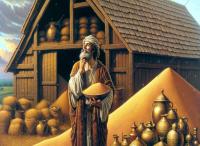
In the Old Testament, in the book of Genesis, Joseph did exactly the same thing as the Rich Fool. He stored large amounts of grain (Genesis 41:48-50). However, the situations were very different. Warned by the dreams of Pharaoh, he preserved the grain from good years to feed the people in time of famine. His motives were not selfish, like those of the man in today’s parable. Everything has been given us by God to use for his greater honour and glory. Jesus did not begrudge people enjoying themselves. He changed a huge amount of water into wine, so that there would be enough for people to have a good time. What He was speaking about was accumulating wealth solely for the benefit of one individual.
People can define themselves by what they own, and it is never enough because they always see that others have more. In today’s world, a small number of people own most of the world’s wealth. The first reading from Ecclesiastes points out very starkly that someone else will benefit by the riches a person leaves behind when they die. This book was attributed to Solomon, as the writer claims to be King of Israel. However scholars have now dated it to between 450 BC and 180 BC. It consists of a series of philosophical reflections on life, which have a sceptical undertone.
Jesus frequently stressed the importance of concentrating on what has true value in life. In Matthew 6:19-21 he told his listeners to store treasure up in Heaven rather than on earth. “When we command our wealth we are rich and free; when our wealth commands us we are poor indeed” (Edmund Burke, quoted by the late Bishop Martin Drennan).